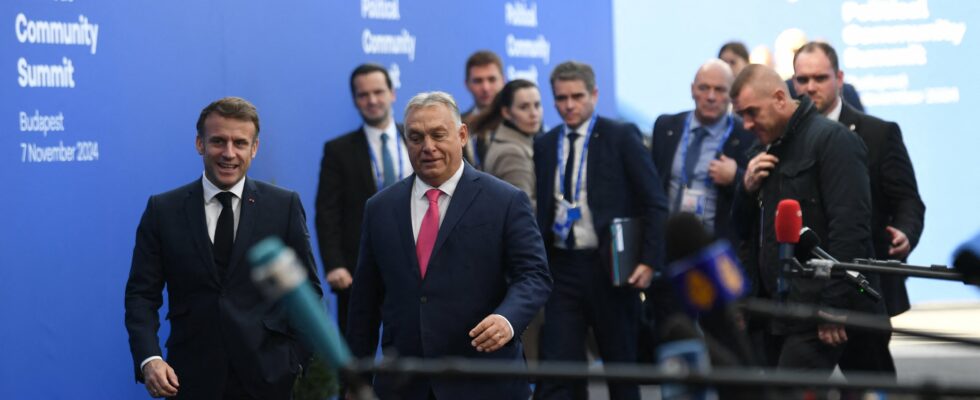Gathered this November 7, on the banks of the Danube, for a sumptuous dinner at the Budapest Parliament, the leaders of the Twenty-Seven risk finding the meal a little indigestible. On the menu: how should the European Union prepare for the return of Donald Trump? As a bonus, they will have to endure the delighted smiles of the master of ceremonies, Viktor Orban. And maybe even toast Trump’s victory with him…
The day before, the Hungarian Prime Minister was the first to celebrate the victory of his “friend”. Because the triumph of the Republican candidate is a bit his. The two men display the same aversion to “Western elites”, they both mention the fight against immigration in speeches and want to end the Russian-Ukrainian conflict as quickly as possible. And let’s not forget their common esteem – which sometimes veers into fascination – for Russian President Vladimir Putin.
This evening, by evoking the coming geopolitical cataclysm, the Twenty-Seven will undoubtedly measure the extent to which Europe risks finding itself “alone in the world”.
With a friend like Trump, no need for enemies
Because with “allies” like Donald Trump, member states do not need enemies. Slayer of multilateralism, the one who made Ronald Reagan’s slogan (“Make America Great Again“) his standard, is not going to do any favors to the Europeans. Obviously, he will behave with them – as with his enemies – in a purely transactional manner. In Brussels, we therefore expect a terrible commercial standoff with his administration. And everyone is anxiously awaiting the name of the future American Treasury Secretary, the one who will carry out Donald Trump’s threat to increase customs duties by at least 10% for his European “allies”…
On the diplomatic level, Trump will certainly try to favor bilateral relations, a strategy which risks undermining European unity. “This is the great danger, warns a diplomat, in Brussels. It would crack the Brussels front and cause violent shocks, likely to cause dislocation.”
If there is one subject on which concerns relate, it is that of defense. Currently, only 23 NATO countries (including 16 European) out of 32 respect the ratio of 2% of GDP recommended by the Alliance. There is no doubt that the next American president will put maximum pressure on his Atlantic partners so that they all reach this level, or even exceed it, like Poland, which now devotes 4.1% of its GDP to it. . Above all, Trump will certainly call into question the “fundamentals”, such as the weight of the United States in NATO, the presence of American forces on European soil and the decision of the Biden administration to install new missiles in Germany in 2025.
Europe, this “Sleeping Beauty”, has finally become aware of the danger, but it has not yet completely emerged from sleep. Accessing this strategic autonomy dear, in particular, to France, supposes two things.
First, that the 27 start producing military equipment in order to depend less on America. Between 2022 and 2022, 78% of arms purchases made by Member States were with non-European countries! However, “the era of geopolitical subcontracting is over”, as Polish Prime Minister Donald Tusk recalled on November 2.
Wait…or act
Then, the Twenty-Seven must match their ambitions with resources. Paralyzed by a Germany which, until the breakup of the coalition in power on November 6, ruled out any additional debt, the Europeans are stuck. And they will be until March 2025, when early elections can be organized across the Rhine. What to do? To wait for ? And repeat over and over again that Europe must “take its responsibilities” and “that it must no longer rely on anyone but itself”? Or act, by finding ways to invest in our defense now – like the Ukrainians who, exasperated at seeing Western weapons arriving in homeopathic doses, are setting up a national defense industry.
In Brussels, someone is actively working on this subject. Future head of European diplomacy, Kaja Kallas is preparing a White Paper on European defense, which will be presented to the Twenty-Seven next March. No doubt the former Estonian Prime Minister will take up, in her recommendations, the idea of a common loan of 100 billion euros to finance the defense industry. What if the Germans have not, by then, resolved their governance problems, and they are still opposed to debt? “We will have to find a solution, and I have one!” exclaims Enrico Letta, former President of the Italian Council and author of a book which has just been published by Odile Jacob, New ideas about Europe and is full of ideas for modernizing the EU. “These 100 billion can be found in the European Stability Mechanism [NDLR : un fonds commun créé pour aider un État membre en difficulté financière]. To allocate them to European defense, it would just be necessary to make a small change of status.”
In Brussels, other avenues are also being discussed. “The European Investment Bank should be able to invest directly in defense programs,” suggests our diplomat. In short, go beyond the stage of incantation and anticipate a “worst-case scenario” which, since the night of November 5 and Trump’s victory, is no longer at all improbable. That of a Europe which would find itself alone facing Vladimir Putin.
